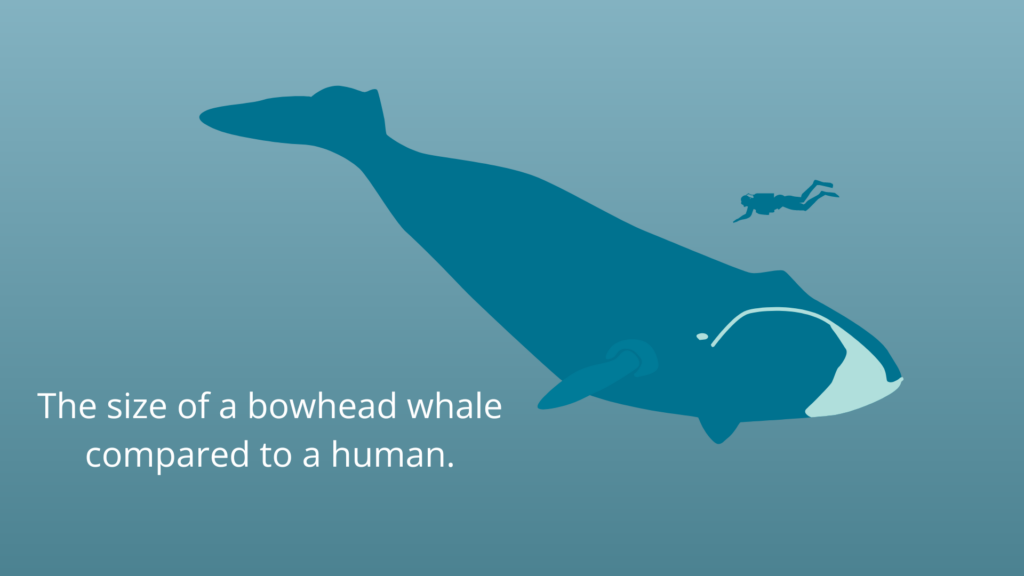© naturepl.com / Martha Holmes / WWF
Bowhead whale
Bowhead whales are the giants of the Arctic. They average about 15 meters in length and have the thickest blubber, thickest skin, greatest longevity, longest baleen, lowest body core temperatures, and the largest head (proportionally) of any cetacean. They can break through sea ice of 20 centimetres – possibly up to one meter – thick with their large, reinforced skulls and powerful bodies.
© ALEKSANDR MAZUROV / Adobe Stock / Stocksy
Bowhead whale facts
Scientific name
Balaena mysticetus
Other names
Greenland right whale
Weight
60-80 tonnes
Length
On average, 15 metres long
Population
There are an estimated 10,000 mature bowhead whales in the wild
IUCN Red List status
Least concern (2018)
Bowheads are also known as the jazz singers of the ocean for their complex vocal ranges.
Along with beluga whales and narwhals, bowhead whales are one of the three whales that live only in Arctic waters. They have a circumpolar distribution across the Arctic and sub-Arctic.

Illustration: Ketill Berger, ketill.berger@filmoform.no / © WWF Global Arctic Programme
Threats to bowhead whales
© VDOS Global / WWF-Canada
Climate change
As climate change continues to warm the Arctic, sea ice continues to decline. Bowhead whales have evolved to a life with sea ice. While scientists have found that some bowhead whale populations seem to be adapting to a warmer Arctic, it is uncertain how bowhead whales will continue to respond as the Arctic gets even warmer.
Warmer Arctic waters have also brought orcas further north. Orcas have been known to attack bowhead whales and cause harm. Scientists have found that in Alaskan waters around 12 per cent of the bowheads had evidence of killer whale attacks.
Shipping and underwater noise
Bowhead whales are known to sing at a similar sound frequency as the underwater noise produced by ships. This is problematic for bowhead whales as it could disrupt their ability to use sound to communicate and therefore important life events, such as mating.
Bowhead whales also swim slowly, often near the water’s surface. This means that they are especially at risk of being struck by ships.
Human activity
There are an increasing number of injuries or deaths to bowhead whales from entanglement in commercial fishing gear. Injuries have been both observed on whales directly and have been photographed during aerial surveys.
What is WWF doing for bowhead whales?
© VDOS Global / WWF-Canada
Arctic blue corridors
Like all whales, bowhead whales do not recognize borders. WWF is advocating for whales to have the space to migrate between different habitats important for their survival. WWF is calling on Arctic states, the Arctic Council, International Maritime Organization, World Shipping Council, shipping industry and shipping companies for action to give migrating whales space to adapt to the rapidly changing Arctic Ocean and make their blue corridors safe from risks and impacts caused by shipping.
© WWF Global Arctic Programme
ArcNet
ArcNet, an Arctic Ocean Network of Priority Areas for Conservation, is a readymade framework that outlines key areas for conservation across the entire Arctic Ocean. By designing a network of priority areas, ArcNet helps strengthen the resilience of Arctic biodiversity – providing space for bowhead and other whales to live.
Our goal is to ensure the protection of 30 per cent of the Arctic Ocean by creating a network of Protected and Conserved Areas. This framework, complete with a map, a guide, tools and methods will help Arctic nations fulfill their commitments.
Advocating for the complete phase-out of fossil fuels
In the absence of stronger climate policies, oil and gas production in the Arctic region is expected to continue to rise until at least the late 2030s or early 2040s. WWF advocates against new oil and gas projects, and for existing ones to be phased out. We work to minimize the impact of the extractive sectors and linear infrastructure and advocate for a just transition to a nature-based economy that focuses on creating green jobs in locally run projects.